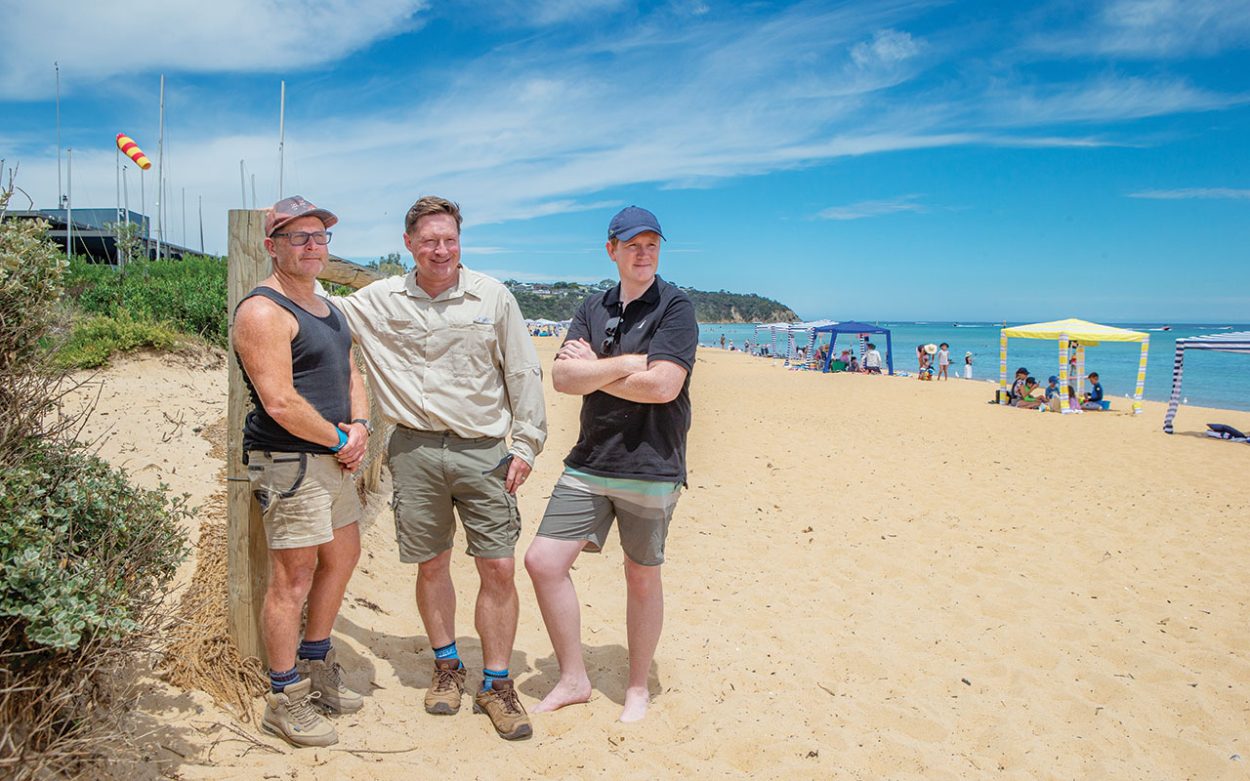A DECISION on the future of beach cleaning has been deferred once again as Mornington Peninsula Shire councillors remain split over whether to use a mechanical rake or hand-cleaning. It marks the fourth time since December last year that councillors and shire officers have pushed back a decision, citing the need for more consideration.
Since 1 July last year, a 12-month trial has seen all Port Phillip beaches across the peninsula cleaned solely by hand on a fortnightly basis instead of a mechanical rake which had reportedly removed about 40 per cent of litter with plastic items being broken down into smaller pieces and buried in the sand (Tide turns for beach cleaning, The News 14/01/25).
But the trial has become a point of contention with proponents of a mechanical rake saying it would streamline the process and be more efficient, while others worry about its impact on delicate coastal ecosystems and biodiversity.
Councillors at their 8 April meeting were expected to decide on whether to adopt a shire officer’s recommendation of implementing a model using 70 per cent hand cleaning and 30 per cent mechanical raking with an outsourced delivery model. Instead they voted for more time – yet again – by deferring a decision on a preferred model until 20 May after expressing mixed opinion. This is despite councillors having attended a “beach cleaning workshop” on 4 February to consider four cleaning option models going forward, as well as weighing up pages of information in a shire report and trial summary.
Mayor Cr Anthony Marsh expressed frustration at the continued indecision, saying, “this can has been kicked down the road so many times”. “We keep getting reports that haven’t answered the questions that we have [and] information that comes in last minute,” he said. “I don’t want to get into another summer where we’re still sitting here talking about which method we’re going to use,” he said, noting a compromise needed to be found. “I think it’s got a bit out of hand in terms of the lack of acceptance that people have differing views on this, but ultimately we need to make a call.”
Deputy mayor Cr Paul Pingiaro agreed, noting “let’s just remember that this was initially meant to come back to us in January then March 25 we were meant to vote on this. Since then, the officer’s recommendation changed again”. “We’ve been given so much information, and it has changed so many times that we actually need to have the full set of information put to us on what we can actually do.”
He added, “We haven’t even mentioned the great work our volunteers do and moving forward we have no mention or support for them”. Pingiaro also cited concerns about community consultation online saying, “one person could have submitted something 100 times; that’s not consultation – that’s leveraging data to suit your narrative.”
Cr David Gill and Cr Kate Roper were both supportive of hand cleaning which attracted applause from the meeting’s gallery. But Gill’s bid to move an amended motion calling for a decision on beach cleaning to be postponed until 15 July was unsuccessful. “I think a lot of people have come down on the side now of the environment and not pristine beaches that are raked so flat that they move sand dunes, and they cause erosion,” Gill said, adding it was important to “see what the best alternative is for our community, our beaches and our environment”.
Roper said, “It’s always concerned me with the amount of rubbish that we’re sending to the tip, which is not rubbish. It’s actual seaweed”. “It’s a substantial amount the ratepayers are paying to have natural material dumped at the tip,” she said, which she estimated to be $360 a tonne. She said a decision to delay a decision on beach cleaning meant they could consider evidence-based data including “revegetated areas that’s providing more stability for the sand of the beach”.
If the hand beach cleaning trial was to be ended immediately, a minimum of 90 days would be needed to change to an alternative method as per the contract. Award winning beach cleaning campaigner Josie Jones OAM, who was present at the council meeting, said the gallery was “filled with passionate community members and volunteers who support hand cleaning and value the importance of the 12 months of data collected”.
“It’s disappointing to see that some councillors continue to overlook the evidence. Cr Allen’s comments about high litter in September fail to acknowledge the root cause — the mismanagement of the raking contract,” she said. “The large volumes of litter observed are not due to lack of intervention, but rather a result of the mechanical raking itself. We are already seeing a decline in litter volumes, which we expect to continue – had the shire been transparent, this would be publicly evident. “When decision-making is influenced by political convenience over community wellbeing, it undermines trust and accountability in local government.”
First published in the Mornington News – 15 April 2025




